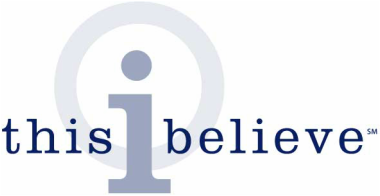
Browse the archives from This I Believe to get a sense of style, voice, and structure. As you will see, there is great variety in each of these areas. In other words, your own This I Believe essay should give you ample opportunity to develop your own voice and put one of your guiding life philosophies into words. That said, below are the guidelines from the program.
Remember that although the essay is personal in nature, it is also an argument. Your belief is a type of claim, one of fact, value, or policy, depending on what you choose. Once you’ve identified your claim, consider what evidence in the way of anecdote, personal experience, observations, statistics, etc. you could use to support your belief. Give some thought on arrangement as well: classical, Rogerian, or somewhere in between.
Essay Guidelines**copied directly from the This I Believe website
We invite you to contribute to this project by writing and submitting your own statement of personal belief. We understand how challenging this is—it requires such intimacy that no one else can do it for you. To guide you through this process, we offer these suggestions:
Tell a story about you: Be specific. Take your belief out of the ether and ground it in the events of your life. Consider moments when belief was formed or tested or changed. Think of your own experience, work, and family, and tell of the things you know that no one else does. Your story need not be heart-warming or gut-wrenching—it can even be funny—but it should be real. Make sure your story ties to the essence of your daily life philosophy and the shaping of your beliefs.
Be brief: Your statement should be between 500 and 600 words. That’s about three minutes when read aloud at your natural pace.
Name your belief: If you can’t name it in a sentence or two, your essay might not be about belief. Also, rather than writing a list, consider focusing on one core belief, because three minutes is a very short time.
Be positive: Please avoid preaching or editorializing. Tell us what you do believe, not what you don’t believe. Avoid speaking in the editorial “we.” Make your essay about you; speak in the first person.
Be personal: Write in words and phrases that are comfortable for you to speak. We recommend you read your essay aloud to yourself several times, and each time edit it and simplify it until you find the words, tone, and story that truly echo your belief and the way you speak.
For this project, we are also guided by the original This I Believe series and theproducers’ invitation to those who wrote essays in the 1950s. Their advice holds up well and we are abiding by it. Please consider it carefully in writing your piece.
In introducing the original series, host Edward R. Murrow said, “Never has the need for personal philosophies of this kind been so urgent.” We would argue that the need is as great now as it was 50 years ago. We are eager for your contribution.
 RSS Feed
RSS Feed
